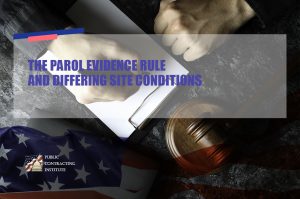A recent case at the Federal Circuit explained the Parol Evidence Rule, and its application to potentially differing site conditions. Nova Group/Tutor-Saliba v. United States, No. 2022-1740 (Fed. Cir. Dec. 11, 2023).
The U.S. Navy, awarded Nova Goup/Tutor Saliba (“Nova”) a contract to build a new maintenance pier in Bremerton, WA. Nova was required to demolish an old pier, design and build a replacement pier (known as “Pier B”) and build a new structure known as the “Mole Quaywall” that would be designed by the government. The two structures would be integrated together during the construction.
During the construction of the Mole Quaywall, Nova encountered subsurface soil conditions that made it difficult to drive some of the piles to reach the tip elevations prescribed by the government, and requiring greater piles lengths than planned. Nova submitted a Request for Equitable Adjustment (“REA 5”) for more than $1 million. Contract Modification 057 was entered into pursuant to the authority of FAR 52.236-2, Differing Site conditions, increasing the contract by $675,000.

Nova encountered pile driving problems at Pier B, and the contractor submitted REA-9, alleging differing site conditions, and seeking more than $10 million in payments, but this was denied by the Navy. Nova alleged Type I differing site conditions at Pier B due to conditions and obstructions not disclosed in the contract, or alternatively, because of Type II differing site conditions due to unknown physical conditions.
During discovery, the Navy produced a pre-negotiation business clearance memo pertaining to REA 5 and Mod 057. The memo stated that while the Navy did not see the condition at Mole Quaywall as being a differing site conditions matter, it agreed the government was responsible for additional costs due to the government providing Mole Quaywalls’ pile tip elevations. Over Nova’s objection, the trial court admitted this memo and then permitted witness testimony supporting the Government’s contention that it did not believe the REA 5 was based on a differing site condition. The trial court (Court of Federal Claims) denied the claim and ruled that neither Type I or Type II differing site conditions had been proven.
First, the Federal Circuit discussed the Parol Evidence rule, stating that it “precludes the admission of extrinsic evidence to modify, supplement or interpret the terms of an integrated agreement.” This rule is a “rule of substantive law, not a rule of evidence.”. On appeal, Nova argued that the trial court erred in considering parol evidence that it claimed contradicted the Navy’s basis for issued Mod 057. Second, it argued that the trial court erred in denying its Pier B differing site conditions claim, based on the design-build nature of the contract.
With regard to the Parol Evidence law, the court noted that even though REA was a fully integrated agreement, this rule does not, per se, foreclose consideration of matters external to the written agreement. With limited exceptions (e.g. fraud) a party cannot supplement or interpret statements that conflict with, supplant or controvert the language of the written agreement. Nor does it prevent a party from presenting evidence that is a recital of fact. The trial court’s admission of the REA-5 memo did not violate the Parol Evidence Rule.
Finally, the court affirmed the trial court’s holding that Nova had failed to establish a differing site condition at Pier B, based on the totality of the evidence.
Takeaway. Use of the Parol Evidence rule does not prevent the introduction of matters external to the written agreement. It merely prevents the use of external evidence to add to or otherwise modify the terms of a written agreement adopted by the parties as their final understanding.
For other helpful suggestions on government contracting, visit:
Richard D. Lieberman’s FAR Consulting & Training at https://www.richarddlieberman.com/, and Mistakes in Government Contracting at https://richarddlieberman.wixsite.com/mistakes.
